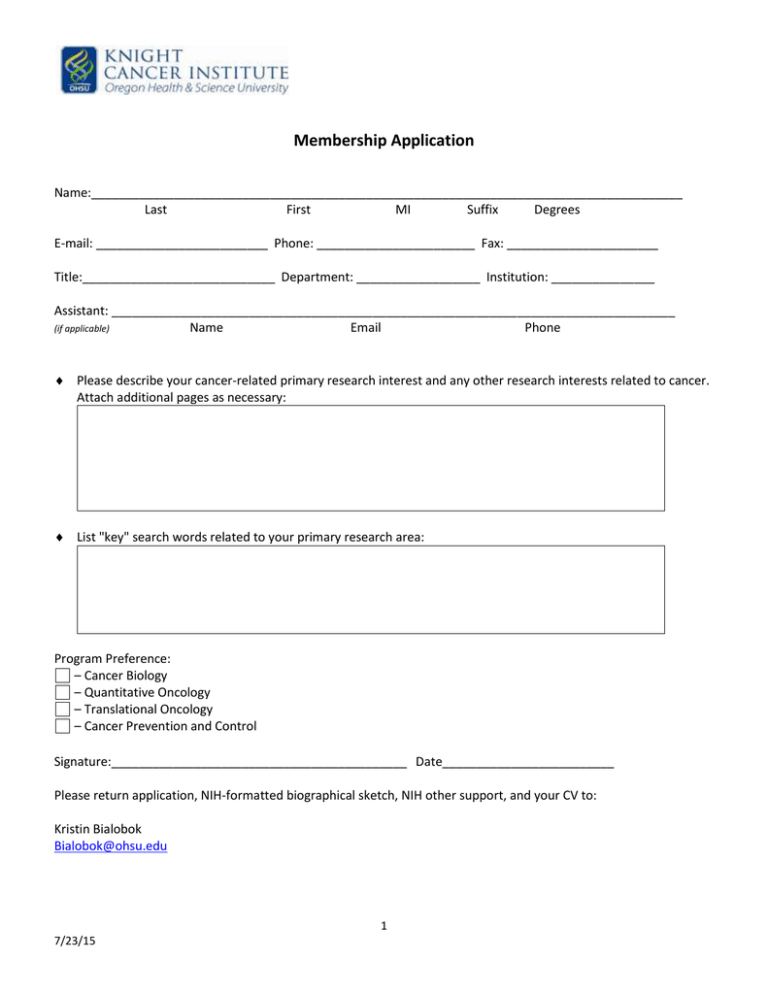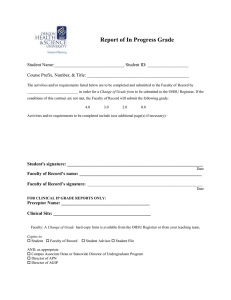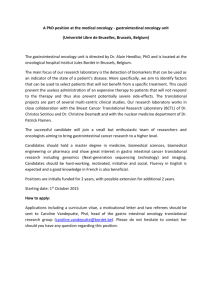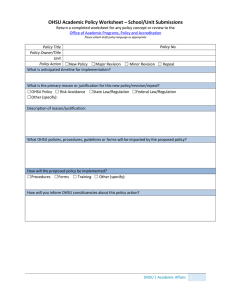Membership Application
advertisement

Membership Application Name:______________________________________________________________________________________ Last First MI Suffix Degrees E-mail: _________________________ Phone: _______________________ Fax: ______________________ Title:____________________________ Department: __________________ Institution: _______________ Assistant: __________________________________________________________________________________ (if applicable) Name Email Phone Please describe your cancer-related primary research interest and any other research interests related to cancer. Attach additional pages as necessary: List "key" search words related to your primary research area: Program Preference: – Cancer Biology – Quantitative Oncology – Translational Oncology – Cancer Prevention and Control Signature:___________________________________________ Date_________________________ Please return application, NIH-formatted biographical sketch, NIH other support, and your CV to: Kristin Bialobok Bialobok@ohsu.edu 1 7/23/15 Mission Statement/Vision The mission of the Knight Cancer Institute (institute) at Oregon Health & Science University (OHSU) is to reduce the impact that cancer has on all of our lives by providing world class, patient focused, comprehensive and coordinated clinical care; conducting groundbreaking research; and training the next generation of oncology researchers and clinicians. To reduce cancer incidence, morbidity and mortality, we must bring together the energy and abilities of the talented and diverse cancer researchers and clinicians at OHSU and its affiliates. The Knight Cancer Institute aims to ensure that no person will have to travel out of our region for world-class care; maintain our leadership position in personalized cancer medicine; and reduce Oregon’s death rate from cancer to the lowest in the nation. History The OHSU Knight Cancer Institute is a matrix cancer center at OHSU in Portland, Oregon. It is one of the 63 NCI cancer centers nationwide, and the only NCI designated cancer center between Sacramento and Seattle. The Knight Cancer Institute has been an NCI-designated cancer center for 14 years and is comprised of five scientific programs and eight core facilities. Among its members are basic, clinical, and population scientists who collaborate on ground-breaking translational research. The institute is directed by Brian Druker, MD. Dr. Druker, member of the National Academy of Sciences and recipient of both the Charles F. Kettering Prize and the Keio Medical Science Prize, has a top priority: recruit and retain outstanding cancer researchers and clinicians to the institute, equip them with the best resources, and support their efforts to target the underlying causes of cancer. Benefits to Membership Members of the Knight Cancer Institute join an outstanding and rapidly growing enterprise of cancer researchers and clinicians embedded within a large, nationally recognized academic health center that is exceptionally dynamic and collaborative. Knight faculty enjoy several specific benefits, including: Participate as a member of one of the CCSG scientific programs Priority access to Knight-supported research cores in addition to access to university-wide shared core resources Access to Knight pilot program research support funds Timely notification of the cancer-related seminars, symposia, and other events Opportunities for multi-disciplinary, trans-departmental research collaborations Funding opportunities for research collaborations with clinicians Membership Requirements The institute welcomes applications for membership from individuals who have major cancer related efforts in research, patient care, or education. The institute’s research programs must fulfill certain NCI criteria to receive approval for funding. They include: (a) evidence that membership leads to intra- and inter-programmatic collaboration, (b) evidence of regular participation of members in program-related meetings, (c) a significant publication record of program members, and (d) evidence that the research activities of members are either cancer focused or relevant to the cancer problem. Physician members should be board certified if specialty (and subspecialty) boards exist in their fields. Eligible for membership are physicians involved in clinical or basic research, research scientists, and education/outreach and prevention control specialists whose primary objective is to organize and help accomplish the basic concept, mission, and goals of the institute. The institute oversees all cancer related-activities on campus to: (1) encourage multidisciplinary patient care in order to improve outcomes in patients with cancer, (2) maximize OHSU’s 2 7/23/15 cancer-related research potential; and (3) directly provide and indirectly enhance education about cancer in our institution and in our communities. By providing administrative and program support, support for core laboratory facilities, pilot projects, and support for new faculty, the Cancer Institute facilitates collaborative interactions across departmental lines in a way that that enhances patient care, research, and education. Research Member This category designates OHSU and Affiliate faculty who are actively conducting basic, translational, clinical, or population-based cancer research. An individual should be a principal investigator on a cancer-related, peer-reviewed funded research* grant and/or a principal investigator of an investigator-initiated trial/play a key scientific role in a national pharmaceutical or cooperative group trial while accruing a minimum of 7 subjects to interventional treatment clinical trials per year. In limited circumstances, this category may include faculty who do not have their own cancer funding but play a significant scientific role as coinvestigators with other Research Members and/or hold key scientific leadership positions. Research Members should have recent cancer-related publications in peerreviewed journals, be active participants in the scientific research program, and be primary users of OHSU Knight shared resources. Associate Research Member This category includes 1) faculty with non-peer-reviewed, cancer-related research funding or NIH K awards/other similar career development awards; 2) clinical researchers who enroll less than 7 subjects on interventional therapeutic clinical trials per year, and are local site PIs of industry and/or NCI cooperative group-sponsored trials but do not meet the criteria of Research Member; 3) Non-OHSU investigators who play an active role in cancer research and show ongoing scientific collaborations with OHSU investigators. Associate Research members should be active participants in the scientific research programs. Affiliate Research Member This category is primarily for the following individuals 1) investigators who have no active, independent, cancer-related extramural funding but are interested and/or involved in cancer research; 2) senior faculty, working in non-cancer related areas who are interested in making their research more cancer relevant. Clinical Member This category is designed for OHSU physicians directly involved in the patient care mission but not involved in initiating their own research initiatives or consistently enrolling subjects on interventional treatment trials. *Definition of Peer Reviewed, Funded Research that Meets Criteria of a Research Member Awarded individual cancer-related research grants, cooperative agreements and research contracts from the NCI or NIH with the following prefixes: R01, R03, R18, R21, R25, R29, R33, R37, R41, R42, R43, R55, P01 (including sub projects); P50 (including sub projects), U01, U10 U54, U56, N01; note career development awards do not count for Research Member category. Please see http://cancercenters.cancer.gov/documents/NCIApprovedFundingOrganizations508C.pdf for a list of other peer-reviewing agencies. 3 7/23/15 Obligations of Membership Members must actively participate in one or more of the designated research programs. Participation includes developing new research projects in collaboration with other members, attendance at research program meetings, sponsored conferences, seminars, etc.; authorship of intra- and inter- programmatic cancer-related manuscripts Clinical Members must actively participate in established multidisciplinary clinics, tumor boards, clinical trial meetings and other OHSU Knight-sponsored clinical and educational programmatic activities. All members must submit all oncology studies involving humans and/or human specimens/data to the Knight Clinical Research Review Committee prior to submission to the Institutional Review Board. All members must provide subject enrollment information on cancer clinical studies regardless if they utilize the Knight Clinical Trials Management services or other staffing mechanism. Members must actively participate in the preparation of the P30 Cancer Center Support Grant application to the NCI by providing administration and Program Leaders requested information such as clinical trial information, publications, research support and other information needed to fulfill P30 Cancer Center Support Grant requirements. Members must acknowledge use of the OHSU Knight Cancer Institute facilities, shared resources, space or assistance (when appropriate) in research publications and new grant submissions. Research Programs Institute membership is separated into five research programs. Each of these programs is broken down into work (focus) groups. The programs and their work groups are detailed below: Cancer Biology Co-Leaders: Lisa Coussens, PhD and Melissa Wong, PhD The Cancer Biology Program represents the basic science research foundation and platform for translation of discovery to clinical care. The primary mission of the Cancer Biology Program is to explore cellular, genetic and molecular mechanisms underlying cancer development and progression in order to gain insight into therapeutically-targetable functions of the evolving tumor, and/or its microenvironment. This mission serves to foster the overarching goal of the Knight Cancer Institute to understand the molecular basis of cancer, and to translate these findings into personalized clinical care. Three scientific focal points of the program currently encompass Signal Transduction, Carcinogenesis/Genetic Instability and Apoptosis. Members of the Signal Transduction Focus Group investigate cellular signaling mechanisms of relevance to normal and cancer cell growth, including the integrated function of growth factors and their receptors, kinasemediated signaling, and regulation of transcription. The major goal and endeavors are to identify and validate new therapeutic targets to aid in anti-cancer drug development. The Carcinogenesis/Genetic Instability group focus their studies around cell cycle control, the regulation of apoptosis, and the relationship of these events to the development of genetic instability and cancer. Because of the seamless nature of cellular regulation that is relevant to the cancer problem, there is a great deal of overlap between the research interests of the two groups. 4 7/23/15 Members of the Apoptosis Focus Group study molecular mechanisms regulating programmed cell death, their impact on development of cancer, their role in cancer therapy, as well as in development of resistance to therapy. Quantitative Oncology Co-Leader: Paul Spellman, PhD and Joe Gray, PhD The Quantitative Oncology Program is focused on the use of data intensive sciences in basic and translational research. The primary mission of Quantitative Oncology is to enable collection, processing, and interpretation of systematic measurements from diverse disciplines ranging from molecular simulations to genomics to tumor imaging. Members engage in research into each of these areas using a diverse skill set including both data acquisition and data analysis. Focus areas include genomics, multi-scale imaging, and statistical inference. Translational Oncology Co-Leader: Raymond Bergan, MD and Sara Courtneidge, PhD The Translational Oncology program focuses on validating and translating novel biological concepts and cutting edge technologies to uncover high value targets and therapeutic approaches. This program also designs and implements impactful investigations in human to assess feasibility and efficacy on underlying driver and cooperating pathways. The scientific goals of the Translational Oncology program are: 1) Identify and validate novel therapeutically targetable pathways. Determine the effects of perturbation, including intrinsic and acquired resistance. Increase focus on early stage disease. 2) Develop systems and tools to interrogate the consequences of target manipulation, to inform design of studies in humans. 3) Develop integrated teams of investigators to facilitate translational therapeutic opportunities. Maintain and strengthen collaborations with other Cancer Center Programs. 4) Modulate the course of cancer in humans. Cancer Prevention and Control Co-Leaders: Kerri Winters-Stone, PhD and Pepper Schedin, PhD The Cancer Prevention and Control Program (CPCP) is dedicated to identifying and addressing modifiable risk factors to prevent cancer, improving screening through development of innovative early detection technologies and approaches that overcome barriers to screening, and to understanding and addressing health issues in cancer survivors from diagnosis to end of life. The program is organized into three distinct focus groups spanning the cancer continuum. These focus groups are represented in the figure below. Importantly, we have integrated the theme of addressing health disparities in underserved populations, including Oregonians across all focus areas. This program comprises the following focus areas: (1) Underserved Populations, (2) Prevention/Risk Reduction, (3) Screening/Early Detection, and (4) Survivorship and Quality of Life. The Underserved Populations group has a particular connection to the Native American population in the Pacific Northwest. Each year numerous Native American researchers come to OHSU to be trained in cancer prevention and control research. Rural Oregonians are also a special population that must navigate particular barriers to cancer treatment and services; the program is involved in designing outreach programs to these groups. The Prevention/Risk Reduction group uses the traditional tools of epidemiology to study causes of cancer: the work of this group aims to lead to interventions directed toward primary cancer prevention. The Screening/Early Detection group works on innovative screening methods to detect early stage diagnosis. 5 7/23/15 The Survivorship and Quality of Life group is focused on documenting and decreasing the short and long-term side effects of cancer and its treatment. This focus group studies secondary and tertiary prevention in cancer patients and survivors. SHARED RESOURCES The Knight Cancer Institute provides funding to support three cancer-specific shared resources, as well as five university-wide share resources. Knight Cancer Biostatistics Shared Resource- Director: Motomi Mori, PhD Knight Cancer Bioinformatics Shared Resource - Director: Adam Margolin, PhD Knight BioLibray- Director: Devon Kelly Flow Cytometry Shared Resource- Director: Philip R. Streeter, PhD Integrated Genomics Shared Resource- Director: Chris Harrington, PhD Histopathology Shared Resource - Director: George Thomas, MD Proteomics Shared Resource - Director: Larry David, PhD Bioanalytical/Pharmacokinetics - Director: Dennis Koop, PhD 6 7/23/15




